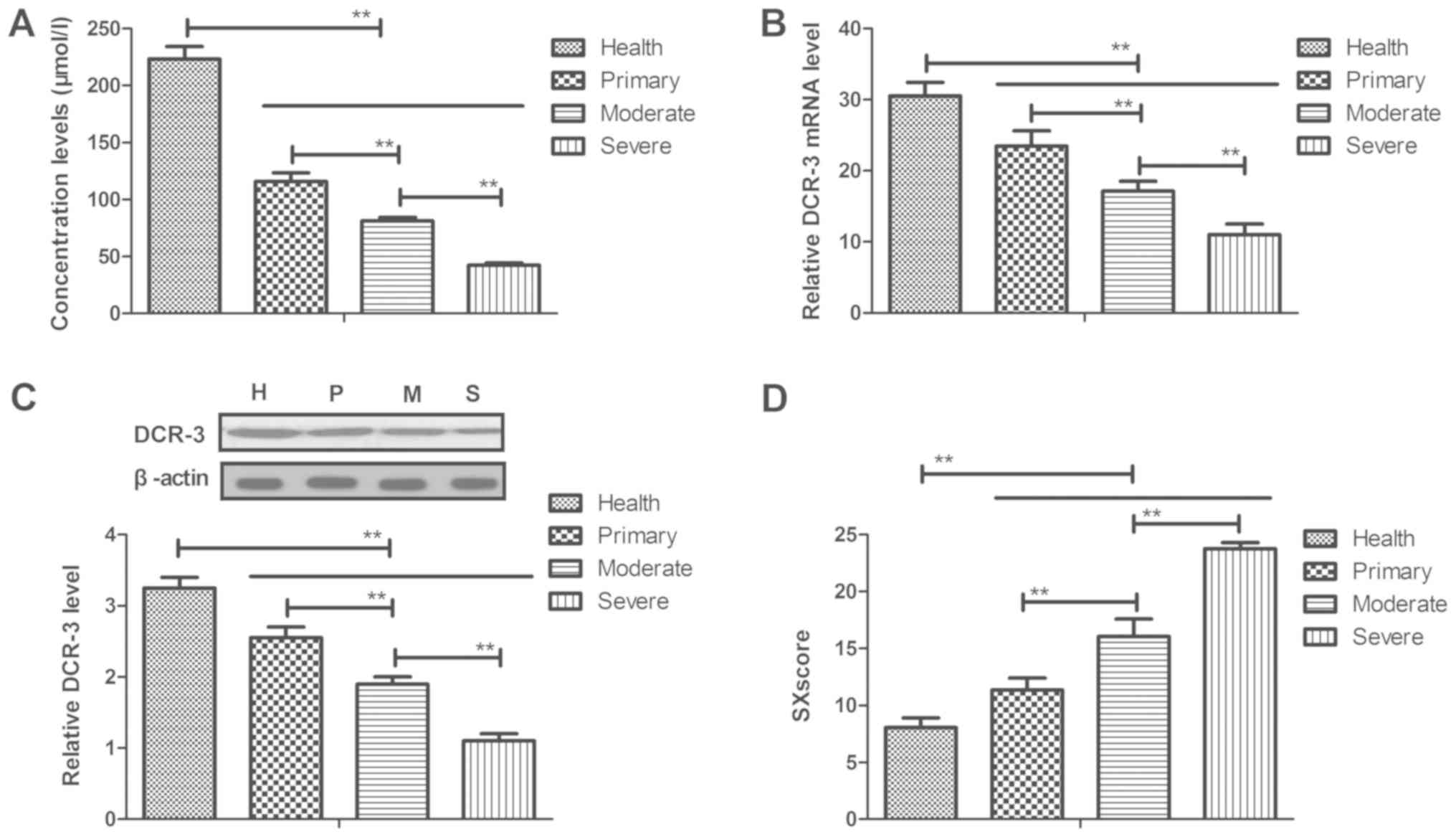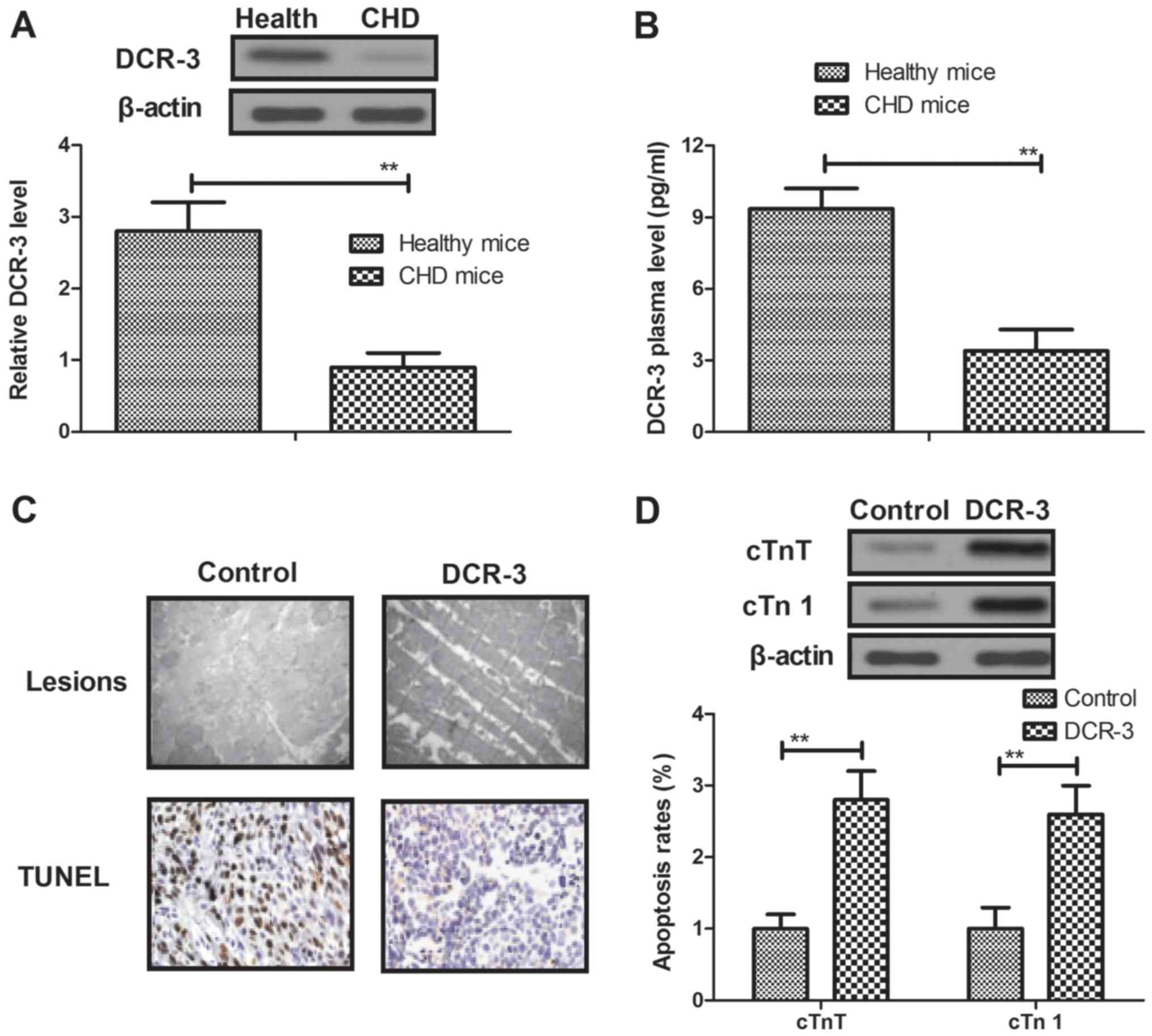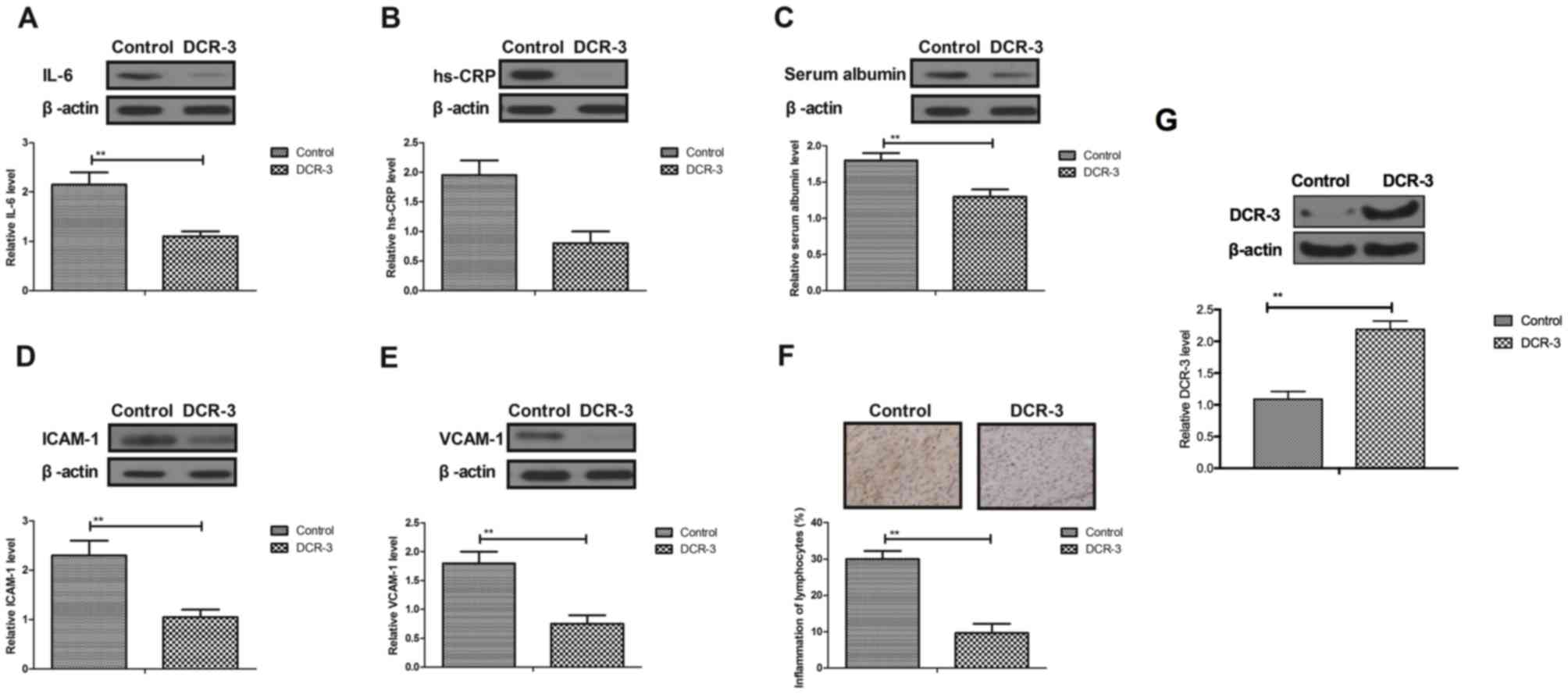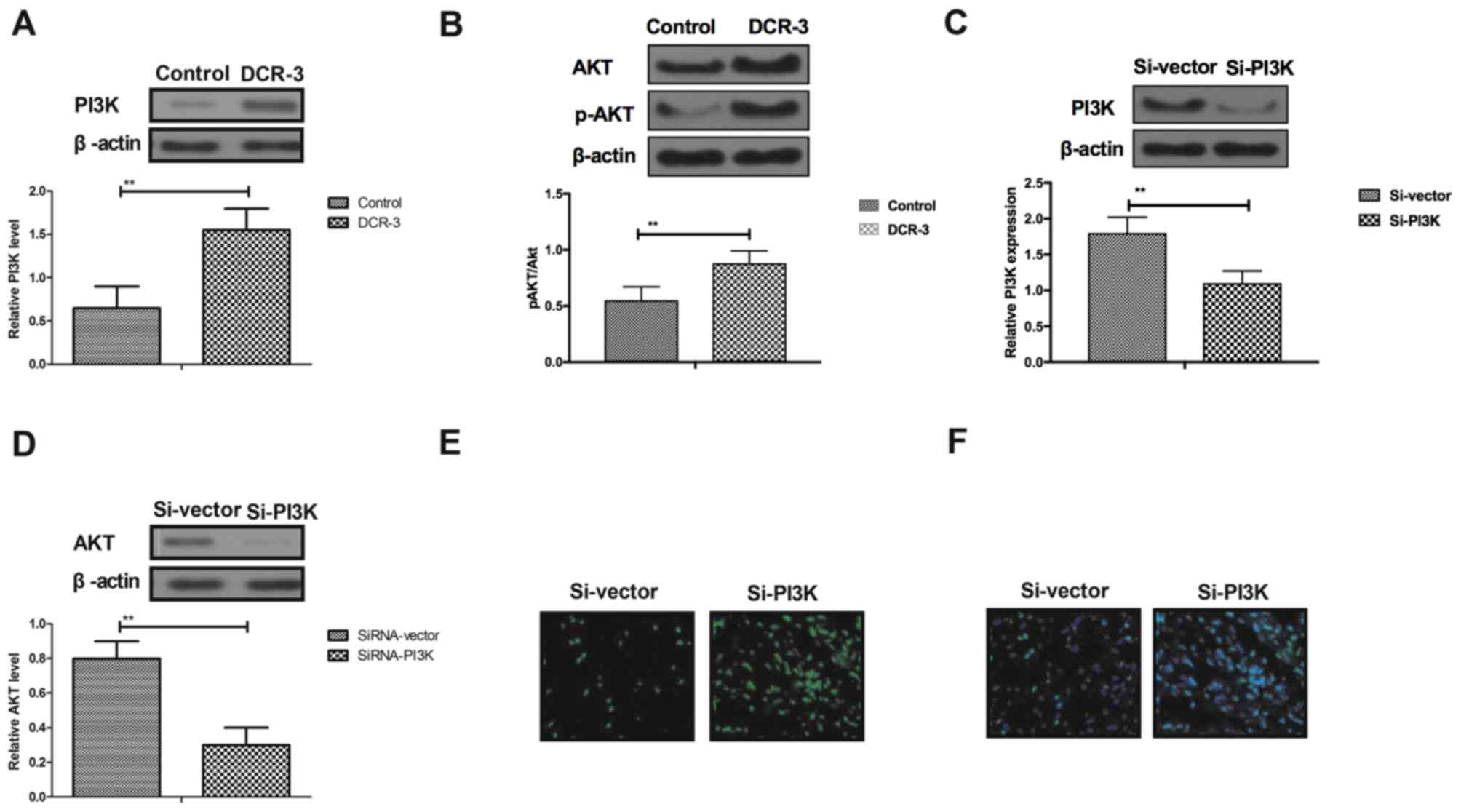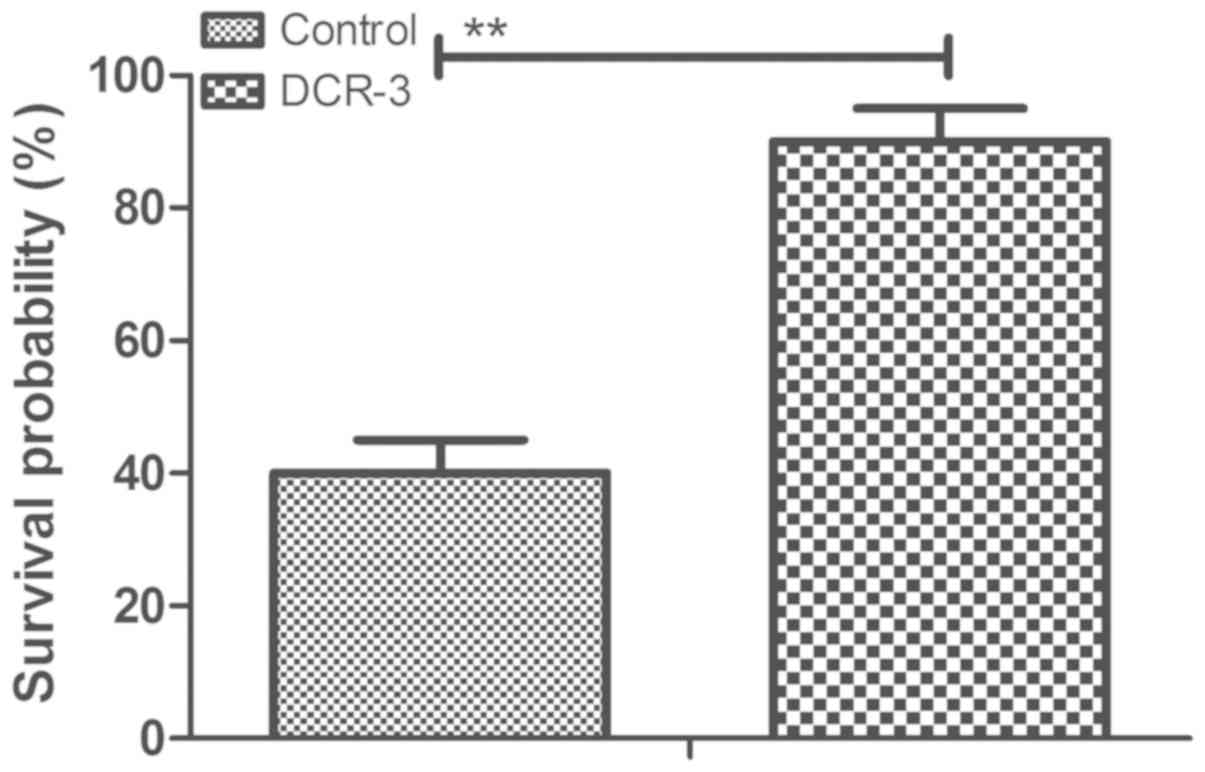|
1
|
Tully PJ and Baumeister H: Collaborative
care for comorbid depression and coronary heart disease: A
systematic review and meta-analysis of randomised controlled
trials. BMJ Open. 5:e0091282015. View Article : Google Scholar : PubMed/NCBI
|
|
2
|
Heikkilä K, Koskinen OA, Agarwal A,
Tikkinen KA, Mäki M and Kaukinen K: Associations of coeliac disease
with coronary heart disease and cerebrovascular disease: A
systematic review and meta-analysis. Nutr Metab Cardiovasc Dis.
25:816–831. 2015. View Article : Google Scholar : PubMed/NCBI
|
|
3
|
Mayor S: Reduced blood pressure and
cholesterol are main factors in fall in deaths from coronary heart
disease. BMJ. 350:h4152015. View
Article : Google Scholar : PubMed/NCBI
|
|
4
|
Niermann C, Gorressen S, Klier M, Gowert
NS, Billuart P, Kelm M, Merx MW and Elvers M: Oligophrenin1
protects mice against myocardial ischemia and reperfusion injury by
modulating inflammation and myocardial apoptosis. Cell Signal.
28:967–978. 2016. View Article : Google Scholar : PubMed/NCBI
|
|
5
|
Guo CX, Jiang X, Zeng XJ, Wang HX, Li HH,
Du FH and Chen BX: Soluble receptor for advanced glycation
end-products protects against ischemia/reperfusion-induced
myocardial apoptosis via regulating the ubiquitin proteasome
system. Free Radic Biol Med. 94:17–26. 2016. View Article : Google Scholar : PubMed/NCBI
|
|
6
|
O'Neal WT, Soliman EZ, Howard G, Howard
VJ, Safford MM, Cushman M and Zakai NA: Inflammation and hemostasis
in atrial fibrillation and coronary heart disease: The REasons for
geographic and racial differences in stroke study. Atherosclerosis.
243:192–197. 2015. View Article : Google Scholar : PubMed/NCBI
|
|
7
|
Geng YJ: Molecular mechanisms for
cardiovascular stem cell apoptosis and growth in the hearts with
atherosclerotic coronary disease and ischemic heart failure. Ann N
Y Acad Sci. 1010:687–697. 2003. View Article : Google Scholar : PubMed/NCBI
|
|
8
|
Fang Y, Chen S, Liu Z, Ai W, He X, Wang L,
Xie P, Jiang B and Fang H: Endothelial stem cells attenuate cardiac
apoptosis via downregulating cardiac microRNA-146a in a rat model
of coronary heart disease. Exp Ther Med. 16:4246–4252.
2018.PubMed/NCBI
|
|
9
|
Xu L, Jiang X, Wei F and Zhu H: Leonurine
protects cardiac function following acute myocardial infarction
through anti-apoptosis by the PI3K/AKT/GSK3β signaling pathway. Mol
Med Rep. 18:1582–1590. 2018.PubMed/NCBI
|
|
10
|
Wang Z, Zhang J, Ren T and Dong Z:
Targeted metabolomic profiling of cardioprotective effect of Ginkgo
biloba L.extract on myocardial ischemia in rats. Phytomedicine.
international journal of phytotherapy and phytopharmacology.
23:621–631. 2016. View Article : Google Scholar
|
|
11
|
Wang L, Niu X, Hu J, Xing H, Sun M, Wang
J, Jian Q and Yang H: After myocardial ischemia-reperfusion,
mir-29a, and let7 could affect apoptosis through regulating IGF-1.
BioMed Research International. 2015:2454122015. View Article : Google Scholar : PubMed/NCBI
|
|
12
|
Wakiyama H, Cowan DB, Toyoda Y, Federman
M, Levitsky S and McCully JD: Selective opening of mitochondrial
ATP-sensitive potassium channels during surgically induced
myocardial ischemia decreases necrosis and apoptosis. Eur J
Cardiothorac Surg. 21:424–433. 2002. View Article : Google Scholar : PubMed/NCBI
|
|
13
|
Elsasser A, Suzuki K, Lorenz-Meyer S, Bode
C and Schaper J: The role of apoptosis in myocardial ischemia: A
critical appraisal. Basic Res Cardiol. 96:219–226. 2001. View Article : Google Scholar : PubMed/NCBI
|
|
14
|
Salmina AB, Shul'man VA, Nikulina SY,
Trufanova LV, Fursov AA, But'yanov PA, Kuskaev AP, Bol'shakova EV
and Kotlovskii MY: Apoptosis of leukocytes as a marker of
neutrophil-endotheliocyte interaction in coronary heart disease.
Bull Exp Biol Med. 144:39–41. 2007.(In English, Russian).
View Article : Google Scholar : PubMed/NCBI
|
|
15
|
Liu LL, Lin LR, Lu CX, Fu JG, Chao PL, Jin
HW, Zhang ZY and Yang TC: Expression of inflammatory and apoptosis
factors following coronary stent implantation in coronary heart
disease patients. Int Immunopharmacol. 11:1850–1854. 2011.
View Article : Google Scholar : PubMed/NCBI
|
|
16
|
Azambuja MI: Inflammation as the cause of
coronary heart disease. Lancet Infect Dis. 10:142–143. 2010.
View Article : Google Scholar : PubMed/NCBI
|
|
17
|
Wu T, Sun QF, Yang PS, Feng W and Liu XL:
Levels of inflammation cytokines in patients with coronary heart
disease and periodontal disease. Zhonghua Kou Qiang Yi Xue Za Zhi.
45:265–268. 2010.(In Chinese). PubMed/NCBI
|
|
18
|
Yan Y, Song D, Liu L, Meng X, Qi C and
Wang J: The relationship of plasma decoy receptor 3 and coronary
collateral circulation in patients with coronary artery disease.
Life Sci. 189:84–88. 2017. View Article : Google Scholar : PubMed/NCBI
|
|
19
|
Marriott HM, Daigneault M, Thompson AA,
Walmsley SR, Gill SK, Witcher DR, Wroblewski VJ, Hellewell PG,
Whyte MK and Dockrell DH: A decoy receptor 3 analogue reduces
localised defects in phagocyte function in pneumococcal pneumonia.
Thorax. 67:985–992. 2012. View Article : Google Scholar : PubMed/NCBI
|
|
20
|
Wu SF, Liu TM, Lin YC, Sytwu HK, Juan HF,
Chen ST, Shen KL, his SC and Hsieh SL: Immunomodulatory effect of
decoy receptor 3 on the differentiation and function of bone
marrow-derived dendritic cells in nonobese diabetic mice: From
regulatory mechanism to clinical implication. J Leukoc Biol.
75:293–306. 2004. View Article : Google Scholar : PubMed/NCBI
|
|
21
|
Jiang M, Lin X, He R, Lin X, Liang L, Tang
R, Xiong D, Wei K, Dang Y, Feng Z and Chen G: Decoy receptor 3
(DcR3) as a biomarker of tumor deterioration in female reproductive
cancers: A meta-analysis. Med Sci Monit. 22:1850–1857. 2016.
View Article : Google Scholar : PubMed/NCBI
|
|
22
|
Dietz R and Rauch B: German Society of
Cardiology-Heart Circulation Research; German Society for
Prevention Rehabilitation of Cardiac Diseases; German Society for
Thoracic CardiovascularSurgery: Guidelines for diagnosis and
treatment of chronic coronary heart disease. Issued by the
executive committee of the German Society of Cardiology - Heart
Circulation Research in cooperation with the German Society for
Prevention and Rehabilitation of Cardiac Diseases and the German
Society for Thoracic and Cardiovascular Surgery. Z Kardiol.
92:501–521. 2003.(In German). PubMed/NCBI
|
|
23
|
Golden HB, Gollapudi D, Gerilechaogetu F,
Li J, Cristales RJ, Peng X and Dostal DE: Isolation of cardiac
myocytes and fibroblasts from neonatal rat pups. Methods Mol Biol.
843:205–214. 2012. View Article : Google Scholar : PubMed/NCBI
|
|
24
|
Lee I, Chalon J, Ramanathan S, Gross S and
Turndorf H: Analgesic properties of meperidine, amitriptyline and
phenelzine in mice. Can Anaesth Soc J. 30:501–505. 1983. View Article : Google Scholar : PubMed/NCBI
|
|
25
|
Livak KJ and Schmittgen TD: Analysis of
relative gene expression data using real-time quantitative PCR and
the 2(-Delta Delta C(T)) method. Methods. 25:402–408. 2001.
View Article : Google Scholar : PubMed/NCBI
|
|
26
|
Börekçi A, Gür M, Şeker T, Baykan AO,
Özaltun B, Karakoyun S, Karakurt A, Türkoğlu C, Makça I and Çaylı
M: Coronary collateral circulation in patients with chronic
coronary total occlusion; its relationship with cardiac risk
markers and SYNTAX score. Perfusion. 30:457–464. 2015. View Article : Google Scholar : PubMed/NCBI
|
|
27
|
Wu ZW, Liu YF, Wang S and Li B: miRNA-146a
induces vascular smooth muscle cell apoptosis in a rat model of
coronary heart disease via NF-κB pathway. Genet Mol Res.
14:18703–18712. 2015. View Article : Google Scholar : PubMed/NCBI
|
|
28
|
Werba JP, Veglia F, Amato M, Baldassarre
D, Massironi P, Meroni PL, Riboldi P, Tremoli E and Camera M:
Patients with a history of stable or unstable coronary heart
disease have different acute phase responses to an inflammatory
stimulus. Atherosclerosis. 196:835–840. 2008. View Article : Google Scholar : PubMed/NCBI
|
|
29
|
Rong R and Xijun X: Erythropoietin
pretreatment suppresses inflammation by activating the PI3K/Akt
signaling pathway in myocardial ischemia-reperfusion injury. Exp
Ther Med. 10:413–418. 2015. View Article : Google Scholar : PubMed/NCBI
|
|
30
|
Funke B, Autschbach F, Kim S, Lasitschka
F, Strauch U, Rogler G, Gdynia G, Li L, Gretz N, Macher-Goeppinger
S, et al: Functional characterisation of decoy receptor 3 in
Crohn's disease. Gut. 58:483–491. 2009. View Article : Google Scholar : PubMed/NCBI
|
|
31
|
Kim S, Kotoula V, Hytiroglou P, Zardavas D
and Zhang L: Significance of increased expression of decoy receptor
3 in chronic liver disease. Dig Liver Dis. 41:591–598. 2009.
View Article : Google Scholar : PubMed/NCBI
|
|
32
|
Chang TY, Hsu CY, Huang PH, Chiang CH, Leu
HB, Huang CC, Chen JW and Lin SJ: Usefulness of circulating decoy
receptor 3 in predicting coronary artery disease severity and
future major adverse cardiovascular events in patients with
multivessel coronary artery disease. Am J Cardiol. 116:1028–1033.
2015. View Article : Google Scholar : PubMed/NCBI
|
|
33
|
Kim S, McAuliffe WJ, Zaritskaya LS, Moore
PA, Zhang L and Nardelli B: Selective induction of tumor necrosis
receptor factor 6/decoy receptor 3 release by bacterial antigens in
human monocytes and myeloid dendritic cells. Infect Immun.
72:89–93. 2004. View Article : Google Scholar : PubMed/NCBI
|
|
34
|
Steptoe A, Wikman A, Molloy GJ,
Messerli-Bürgy N and Kaski JC: Inflammation and symptoms of
depression and anxiety in patients with acute coronary heart
disease. Brain Behav Immun. 31:183–188. 2013. View Article : Google Scholar : PubMed/NCBI
|
|
35
|
Li SR, Wang TH and Zhang BJ: Effects of
naoxintong capsule on the inflammation and prognosis in borderline
lesion coronary heart disease patients. Zhongguo Zhong Xi Yi Jie He
Za Zhi. 32:607–611. 2012.(In Chinese). PubMed/NCBI
|
|
36
|
El-Mesallamy HO, Hamdy NM, Salman TM and
Ibrahim SM: Adiponectin and sE-selectin concentrations in relation
to inflammation in obese type 2 diabetic patients with coronary
heart disease. Angiology. 63:96–102. 2012. View Article : Google Scholar : PubMed/NCBI
|
|
37
|
Wortinger MA, Foley JW, Larocque P,
Witcher DR, Lahn M, Jakubowski JA, Glasebrook A and Song HY: Fas
ligand-induced murine pulmonary inflammation is reduced by a stable
decoy receptor 3 analogue. Immunology. 110:225–233. 2003.
View Article : Google Scholar : PubMed/NCBI
|
|
38
|
Chen SJ, Wang YL, Kao JH, Wu SF, Lo WT, Wu
CC, Tao PL, Wang CC, Chang DM and Sytwu HK: Decoy receptor 3
ameliorates experimental autoimmune encephalomyelitis by directly
counteracting local inflammation and downregulating Th17 cells. Mol
Immunol. 47:567–574. 2009. View Article : Google Scholar : PubMed/NCBI
|
|
39
|
Zhang M, He H, Wang ZM, Xu Z, Zhou N, Tao
Z, Chen B, Li C, Zhu T, Yang D, et al: Diagnostic and prognostic
value of minor elevated cardiac troponin levels for percutaneous
coronary intervention-related myocardial injury: A prospective,
single-center and double-blind study. J Biomed Res. 28:98–107.
2014.PubMed/NCBI
|
|
40
|
Apak I, Iltumur K, Tamam Y and Kaya N:
Serum cardiac troponin T levels as an indicator of myocardial
injury in ischemic and hemorrhagic stroke patients. Tohoku J Exp
Med. 205:93–101. 2005. View Article : Google Scholar : PubMed/NCBI
|
|
41
|
Nesher N, Zisman E, Wolf T, Sharony R,
Bolotin G, David M, Uretzky G and Pizov R: Strict thermoregulation
attenuates myocardial injury during coronary artery bypass graft
surgery as reflected by reduced levels of cardiac-specific troponin
I. Anesth Analg. 96:328–335. 2003. View Article : Google Scholar : PubMed/NCBI
|
|
42
|
Boriani G, Biffi M, Cervi V, Bronzetti G,
Magagnoli G, Zannoli R and Branzi A: Evaluation of myocardial
injury following repeated internal atrial shocks by monitoring
serum cardiac troponin I levels. Chest. 118:342–347. 2000.
View Article : Google Scholar : PubMed/NCBI
|
|
43
|
Wu ZW, Liu YF, Wang S and Li B:
Corrigendum miRNA-146a induces vascular smooth muscle cell
apoptosis in a rat model of coronary heart disease via NF-kappaB
pathway - Genet. Mol. Res. 14(4): 18703–18712, Genet Mol Res 15.
2016. View Article : Google Scholar
|
|
44
|
Im J, Kim K, Hergert P and Nho RS:
Idiopathic pulmonary fibrosis fibroblasts become resistant to Fas
ligand-dependent apoptosis via the alteration of decoy receptor 3.
J Pathol. 240:25–37. 2016. View Article : Google Scholar : PubMed/NCBI
|
|
45
|
Liang D, Hou Y, Lou X and Chen H: Decoy
receptor 3 improves survival in experimental sepsis by suppressing
the inflammatory response and lymphocyte apoptosis. PLoS One.
10:e01316802015. View Article : Google Scholar : PubMed/NCBI
|
|
46
|
Zhang Y, Li D, Zhao X, Song S, Zhang L,
Zhu D, Wang Z, Chen X and Zhou J: Decoy receptor 3 suppresses
FasL-induced apoptosis via ERK1/2 activation in pancreatic cancer
cells. Biochem Biophys Res Commun. 463:1144–1151. 2015. View Article : Google Scholar : PubMed/NCBI
|
|
47
|
Koksal IT, Sanlioglu AD, Karacay B,
Griffith TS and Sanlioglu S: Tumor necrosis factor-related
apoptosis inducing ligand-R4 decoy receptor expression is
correlated with high Gleason scores, prostate-specific antigen
recurrence, and decreased survival in patients with prostate
carcinoma. Urol Oncol. 26:158–165. 2008. View Article : Google Scholar : PubMed/NCBI
|
|
48
|
Zhou J, Song S, He S, Wang Z, Zhang B, Li
D and Zhu D: Silencing of decoy receptor 3 (DcR3) expression by
siRNA in pancreatic carcinoma cells induces Fas ligand-mediated
apoptosis in vitro and in vivo. Int J Mol Med. 32:653–660. 2013.
View Article : Google Scholar : PubMed/NCBI
|
|
49
|
You RI, Chang YC, Chen PM, Wang WS, Hsu
TL, Yang CY, Lee CT and Hsieh SL: Apoptosis of dendritic cells
induced by decoy receptor 3 (DcR3). Blood. 111:1480–1488. 2008.
View Article : Google Scholar : PubMed/NCBI
|
|
50
|
Zhang Z, Li S, Cui M, Gao X, Sun D, Qin X,
Narsinh K, Li C, Jia H, Li C, et al: Rosuvastatin enhances the
therapeutic efficacy of adipose-derived mesenchymal stem cells for
myocardial infarction via PI3K/Akt and MEK/ERK pathways. Basic Res
Cardiol. 108:3332013. View Article : Google Scholar : PubMed/NCBI
|
|
51
|
Hu Y, Li L, Yin W, Shen L, You B and Gao
H: Protective effect of proanthocyanidins on anoxia-reoxygenation
injury of myocardial cells mediated by the PI3K/Akt/GSK-3beta
pathway and mitochondrial ATP-sensitive potassium channel. Mol Med
Rep. 10:2051–2058. 2014. View Article : Google Scholar : PubMed/NCBI
|
|
52
|
Fang J, Hu F, Ke D, Yan Y, Liao Z, Yuan X,
Wu L, Jiang Q and Chen L: N,N-dimethylsphingosine attenuates
myocardial ischemia-reperfusion injury by recruiting regulatory T
cells through PI3K/Akt pathway in mice. Basic Res Cardiol.
111:322016. View Article : Google Scholar : PubMed/NCBI
|















